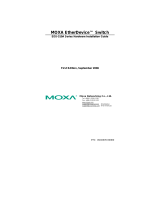
- 10 -
Terminal Block
Terminal block (JP1)—R/C (XCFR2, XCFR8), socket soldered on to the
PWB, DINKLE ENTERPRISE CO., LTD, type 2EHDRM, rated 300 V, 15 A,
105°C. Mating with plug type 2RSDAM, 2ESDPM, 2ESDPLM or 2ESDVM,
rated 300 V, 15 A, 105°C. The plug half connection is secured by screws.
Suitable for 12-24 AWG wire size, secured on plug by screws, torque
value 0.5 N-m (4.4253 lb-in).
Ethernet Ports
The 10/100/1000 Mbps Ethernet ports use RJ45 connectors.
Serial Ports
The serial ports use DB9 connectors. Each port can be configured by
software for RS-232, RS-422, or RS-485 port. The pin assignments for
the ports are shown in the following table:
Pin RS-232 RS-422
SD Slot
The MC-1100 (MC-1111 and MC-1121 Series) has an SD slot for storage
expansion. The SD slot allows users to plug in an SD 3.0 standard SD card.
To install an SD card, gently remove the outer cover, and then insert the
SD card into the slot.
USIM Slot
The MC-1100 (MC-1121 and MC-1122 Series) has a USIM slot for 3G/LTE
wireless Internet connections. To install a USIM card, gently remove the
outer cover from the bottom, and then insert the USIM card into the slot.
USB Hosts
The MC-1100 has 2 USB 2.0 Type A connectors. 2 USB 2.0 ports are
located on the front panel. The port supports keyboard and mouse, and
can also be used to connect a flash disk for storing large amounts of data.















